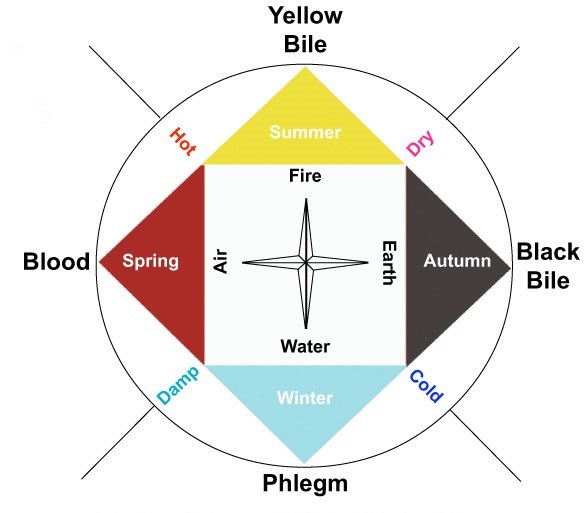Importance and specifications of "Akhlat"- Phlegm

As a general principle the Iranian traditional medicine highly recommends individuals to abstain from food stuff which could harm them as they could cause an imbalance in the quantity or quality of one or more than one of the four bodily humors.
The four humors, namely yellow bile, blood, black bile, and phlegm, also called ‘Akhlat’ in Persian, are formed from consumed foods in the liver and gastrointestinal system after digestion.
Each body tissue will mainly feed from some of the four humors more than the other ones, so in order to have healthy body parts and internal organs one should eat as healthy as they can in accordance with their specific temperament (Mizaj) to keep the four aforesaid humors in balance and hence remain healthy.
Feeling heavy specially the eyelids and the head, getting puffy and swollen, getting sweaty palms, getting pale, increased mucus production, stringy or thick saliva, weakness, sagging of skin, sleepiness, having trouble waking up, memory loss, dizziness, frequent urination, sour burp, and diarrhea are some of the symptoms of excessive phlegm in the body.
Phlegm
After the humor of blood, phlegm is the second most abundant humor in the body which has a cold and wet Mizaj.
Phlegm is a slimy liquid very much like water (colorless, odorless and tasteless) and it can be found in body parts such as dermis, adipose tissue (body fat), synovial fluid, and the mucus lining the lungs, throat, mouth, nose, etc. which require humidity and flexibility to function properly.
The cerebrospinal fluid which is the clear, colorless body fluid found in the brain and spinal cord is also made up of phlegm.
One of the advantages of the phlegm is that by the temperature rise in each body part it can turn into the humor of blood and can feed that specific organ, so phlegm can be considered as a kind of food supply for the body.
Maintaining or improving flexibility is owed to the humor of phlegm, so very much like other humors phlegm is of great benefits to the body.
Phlegm producing foods
Food that look like water or have similar characteristics as water by being odorless, tasteless, colorless, and food that are watery and slimy such as soups, broths, and sour stews containing vegetables, water from boiled Kaleh pache (dish of boiled cow or sheep's feet and/or head) or tripe (edible lining from the stomachs of sheep), frozen food, raw food, or cooked food served cold, consuming too much rice without bran, potato, tomato, sauces particularly mayonnaise, salads, dairy products, water, fruits and vegetables with cold Mizaj (cooling characteristics) such as lettuce, cucumber, citrus and sour fruits could form or increase phlegm in the body.

Excessive phlegm symptoms
Feeling heavy specially the eyelids and the head, getting puffy and swollen, feeling cold (in contrast with people with sanguine temperament), breaking into cold sweat, getting sweaty palms, getting pale, not feeling thirsty or feeling false thirst, increased mucus production (getting runny nose or watery eyes), stringy or thick saliva, weakness, weakened muscle, sagging of skin, sleepiness, having trouble waking up especially in dam places or northern cities with high humidity and during cold seasons, memory loss, dizziness, difficulty learning or remembering something, having difficulty digesting food, bloating, frequent urination, sour burp, and diarrhea are the symptoms of excessive phlegm in the body.
On the other hand joint making cracking sounds can be a symptom of lack of phlegm. Joints, respiratory and digestive tract would function healthily with sufficient amounts of phlegm.
How to avoid, treat excessive phlegm

People with excessive phlegm should avoid consuming food that could increase phlegm in the body. Fasting, being hungry and thirsty would benefit such people in that it let them get rid of the excessive phlegm build up in their bodies and become warmer and drier.
People suffering excessive phlegm should eat low volume, high calorie food stuff such as kebab with small portions of rice and bread, roasted chicken heart for a week, bird meat like quail and partridge, toasted nuts (in general toasting, stir frying, and sautéing food stuff is good for such people), dried fig, raisin, dried berries, rock candy, honey, natural sweets, one tea spoon of date and grape syrup a day, sweet homemade jams, fairly salty food with spices such as pepper, cinnamon, cardamom, vegetables such as mint, leek, tarragon, parsley and savory as well as fruits like ripen and sweet apple, mango, banana, and pear.
Seyed Mahdi Mirghazanfari, MD, holds a PhD degree in medical physiology and is an Iranian-Islamic traditional medicine researcher. He is also an assistant professor in AJA University of Medical Sciences, Tehran.
MQ/MG
